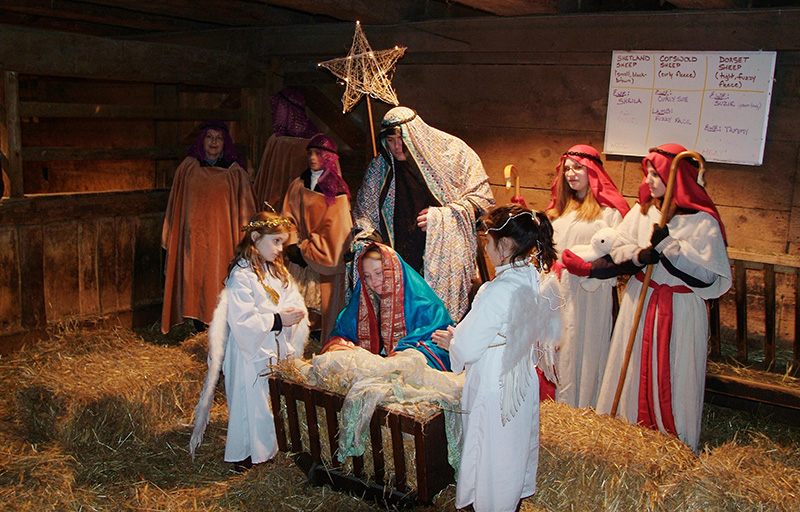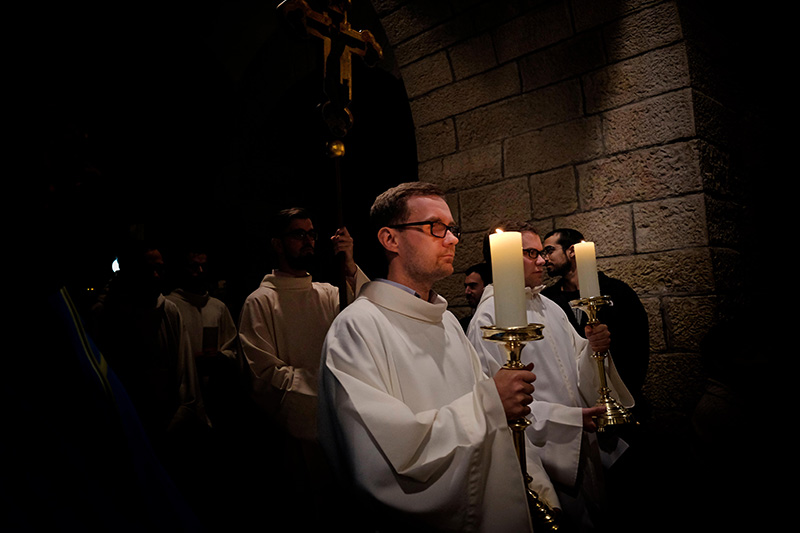“He [the cellarer] should take the greatest care of the sick, of children, guests and the poor.” These words emphasise the importance of charity, compassion, and care for the vulnerable and less fortunate. They come from the Rule of St Benedict, a text that has guided monastic life since it was composed in the sixth century. Echoing over the centuries, they especially resonate this Christmas, when the news is dominated by reports of hunger, poverty, cold and desperate migrants.
Medieval monasteries took their responsibilities regarding charity and hospitality seriously, especially at Christmas. Thirteenth-century financial records from Beaulieu Abbey (Hampshire), for instance, record that on Christmas Eve, meat and drink was provided to as many poor men who gathered at its gates as there were monks in the monastery. This tradition of monastic Christmas charity was maintained until the very end of the Middle Ages. A carol penned by a monk of Battle Abbey (East Sussex) in the early sixteenth century urged the medieval faithful to:
Care not too much for worldly pleasure,
Lest hereafter you lose a better treasure,
For sorrow increases, and ennui is bold
When charity is scanty and waxes cold.
The anonymous author possibly lived long enough to be among the monks who, in 1538, signed the deed surrendering their monastery to Henry VIII during the Dissolution of the Monasteries. The Christmas largesse and daily doles provided by over 800 abbeys, priories and hospitals to the poor and needy ceased. Despite the high-minded ideals of Thomas Cromwell, Henry’s chief minister, little (if any) of the monastic wealth that swelled the royal coffers was directed to charitable purposes. Neighbourly solidarity and the charity dispensed by parishes, elite households and civic institutions struggled to plug this gaping gap in Tudor welfare provision.
Christmas celebrations and traditions, including the distribution of doles, were soon embroiled in the early modern culture wars. Traditionally minded gents, conscious of earlier notions of hospitality that stressed the requirement to receive guests as if they were Christ Himself, kept open-house at Christmas, providing food in their hall and heat at their heath to all-comers. By the early seventeenth century, Father Christmas was the embodiment of these munificent, hospitable traditions.
But lest we get too misty eyed and nostalgic, such tokens of “good lordship” were very much in the interests of the ruling elites. The forelock tugging that accompanied and rewarded gentry Christmas largesse acted as a release valve in what was a highly unequal and rigidly hierarchical society.
Despite such utility, all this merrymaking and liberality got up the noses of hotter types of Protestant. They believed that indiscriminate handouts promoted idleness and fecklessness). Instead, they wanted charity to be directed to the “deserving” poor (sound familiar?). The most charitable way of helping a “sturdy” beggar was to administer a good flogging. Moreover, they believed that faith and not good works that provided the route to salvation. The words of a lengthy edifying sermon would provide nourishment enough against the mid-winter cold.
By the eighteenth century, the simultaneous reformations of religion and manners had left Christmas and its attendant charitable provisions battered and bruised. It was likely about this time that the tradition of “Thomasing” emerged.
It was so called because on 21 December, the feast of St Thomas the Apostle, the poor of the parish, especially elderly women, would visit their better off neighbours, begging for cash or provisions for a Christmas dinner.
In 1894, a Midland’s author recalled how, “In the days of the Georges [King George I-IV, 1714-1830], when red cloaks were commonly worn by elderly women, it was a common sight to see, in the grey light of a December morning, groups of bent and withered figures going from door to door”. The description evokes pity rather than nostalgia. Especially as they were far from guaranteed a warm welcome. A Staffordshire iron master boasted how he “used to take his stick” to those begging for alms at his door on 23 November, St Clement’s Day. It’s a harshness worthy of the a Dickens caricature.
By the early twentieth century, these traditions had all but died out. In large part this was due to the introduction in 1908 of the first old age pension.
I wish I could conclude, “and good riddance, too.” The dismantling of the Welfare State and attendant and now all too obvious profusion of poverty in recent years means otherwise. So instead I’ll repeat the words of St Benedict’s Rule with which I opened this column. They come from Chapter 31, concerning the sort of person the cellarer – the senior monk in charge of a monastery’s provisions – should be: “He should take the greatest care of the sick, of children, guests and the poor knowing for certain that he will have to give an account of all these on the Day of Judgement.”
Our politicians and policy makers would do well to take note.



 Loading ...
Loading ...
What do you think?
You can post as a subscriber user ...
User comments (0)